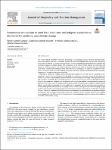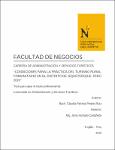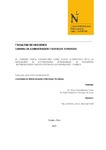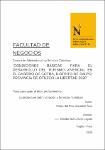Mostrar el registro sencillo del ítem
Community eco-tourism in rural Peru: Resilience and adaptive capacities to the Covid-19 pandemic and climate change
| dc.contributor.author | Gabriel-Campos, Edwin | |
| dc.contributor.author | Werner-Masters, Katarzyna | |
| dc.contributor.author | Cordova-Buiza, Franklin | |
| dc.contributor.author | Paucar-Caceres, Alberto | |
| dc.date.accessioned | 2021-11-17T21:01:30Z | |
| dc.date.available | 2021-11-17T21:01:30Z | |
| dc.date.issued | 2021-08-05 | |
| dc.identifier.citation | Gabriel, E., ...[et al.]. (2021). Community eco-tourism in rural Peru: Resilience and adaptive capacities to the Covid-19 pandemic and climate change. Journal of Hospitality and Tourism Management, 48. https://doi.org/10.1016/j.jhtm.2021.07.016 | es_PE |
| dc.identifier.uri | https://hdl.handle.net/11537/28458 | |
| dc.description.abstract | RESUMEN The recent outbreak of COVID-19 has been devastating for international tourism, adversely affecting destinations, organizations, and local communities. In particular, the crisis highlights the need for local communities reliant on rural tourism to enhance their resilience to the risks simultaneously generated by the pandemic and accelerating impacts of climate change. This is important as the effects of these hazards are intertwined and cannot be treated in isolation. We explore community responses and resilience through case study Quebrada Verde, Peru, a small rural community in the Andes Mountains. Specifically, we report on a qualitative examination involving in-depth semi-structured interviews and focus groups with key informants from the community, supplemented by relevant documentary analysis. Drawing on community resilience and social networks perspectives, we find that the community's preparedness to both threats is unbalanced. On one hand, the community eco-tourism system has developed sufficient tools to adapt to the temporary effects of COVID-19 derived from the community's self-organization skills and topophilia. Specifically, the community possesses a cohesive social structure, it has a solid cultural identity rooted in its customs and traditions, and maintains a social humour that enables it to see the positive aspects of adversity. On the other hand, the analysis of the measures towards strengthening the resilience to climate change delivers mixed results. In particular, the relationship that the community has built with other local organizations to successfully prevent and react to climate change is weak. Therefore, stronger efforts towards bridging this gap must be implemented in order to sustain the wider social network of such organizations, of which the community is a part. This would enable further development and implementation of appropriate risk management strategies to counteract climate change, enhancing the community's resilience of its eco-tourism system to this emergent threat. Importantly, this finding might be relevant to other local communities seeking to improve their resilience to COVID-19 and climate change. | es_PE |
| dc.format | application/pdf | es_PE |
| dc.language.iso | eng | es_PE |
| dc.publisher | Elsevier | es_PE |
| dc.rights | info:eu-repo/semantics/openAccess | es_PE |
| dc.rights.uri | https://creativecommons.org/licenses/by-nc-sa/4.0/ | * |
| dc.source | Universidad Privada del Norte | es_PE |
| dc.source | Repositorio Institucional - UPN | es_PE |
| dc.subject | Resiliencia | es_PE |
| dc.subject | Turismo | es_PE |
| dc.subject | Desarrollo sostenible | es_PE |
| dc.subject | Covid-19 | es_PE |
| dc.subject | Cambios climáticos | es_PE |
| dc.title | Community eco-tourism in rural Peru: Resilience and adaptive capacities to the Covid-19 pandemic and climate change | es_PE |
| dc.type | info:eu-repo/semantics/article | es_PE |
| dc.publisher.country | ES | es_PE |
| dc.identifier.journal | Journal of Hospitality and Tourism Management | es_PE |
| dc.description.peer-review | Revisión por pares | es_PE |
| dc.subject.ocde | https://purl.org/pe-repo/ocde/ford#5.02.04 | es_PE |
| dc.description.sede | Los Olivos | es_PE |
| dc.identifier.doi | https://doi.org/10.1016/j.jhtm.2021.07.016 |







